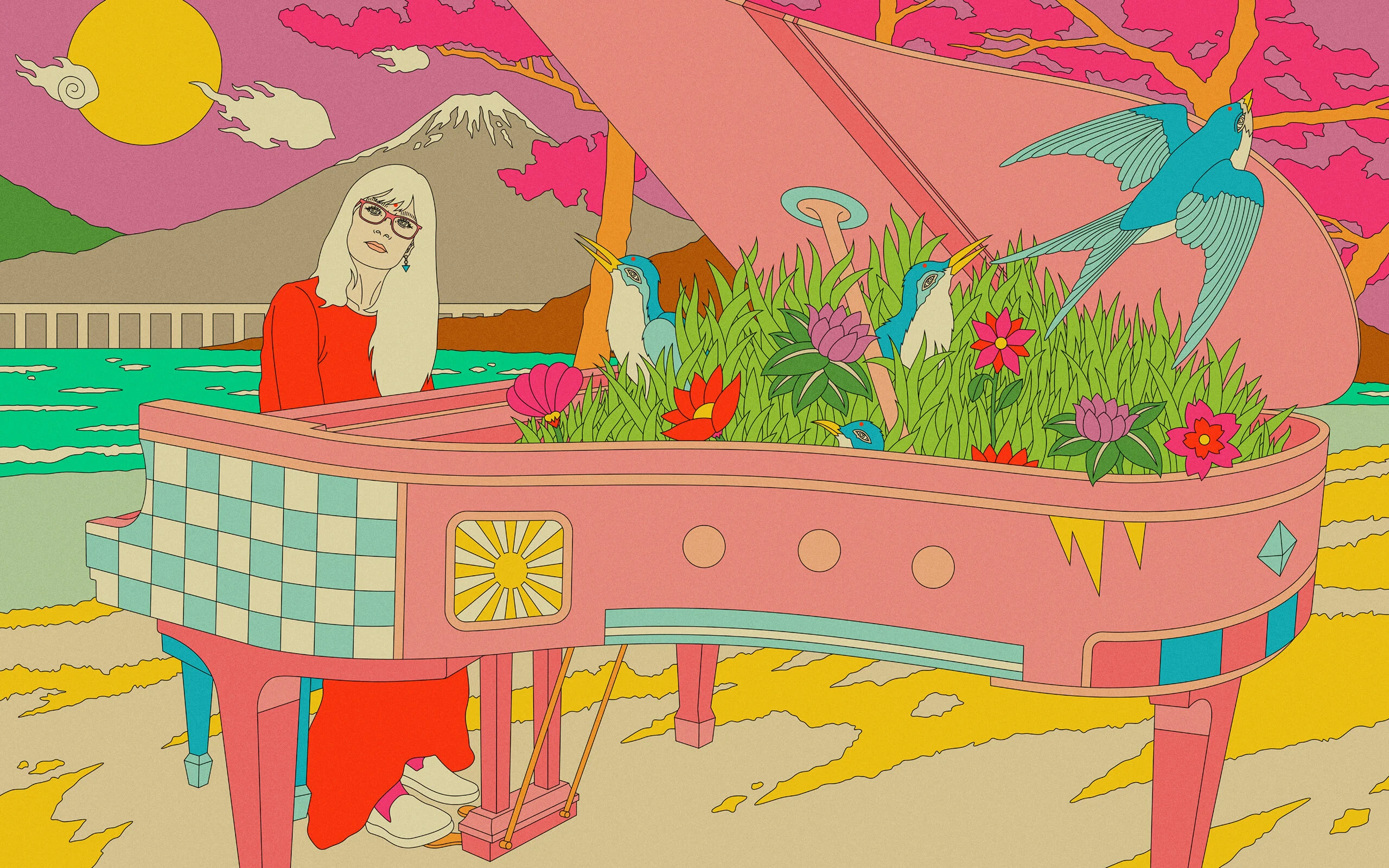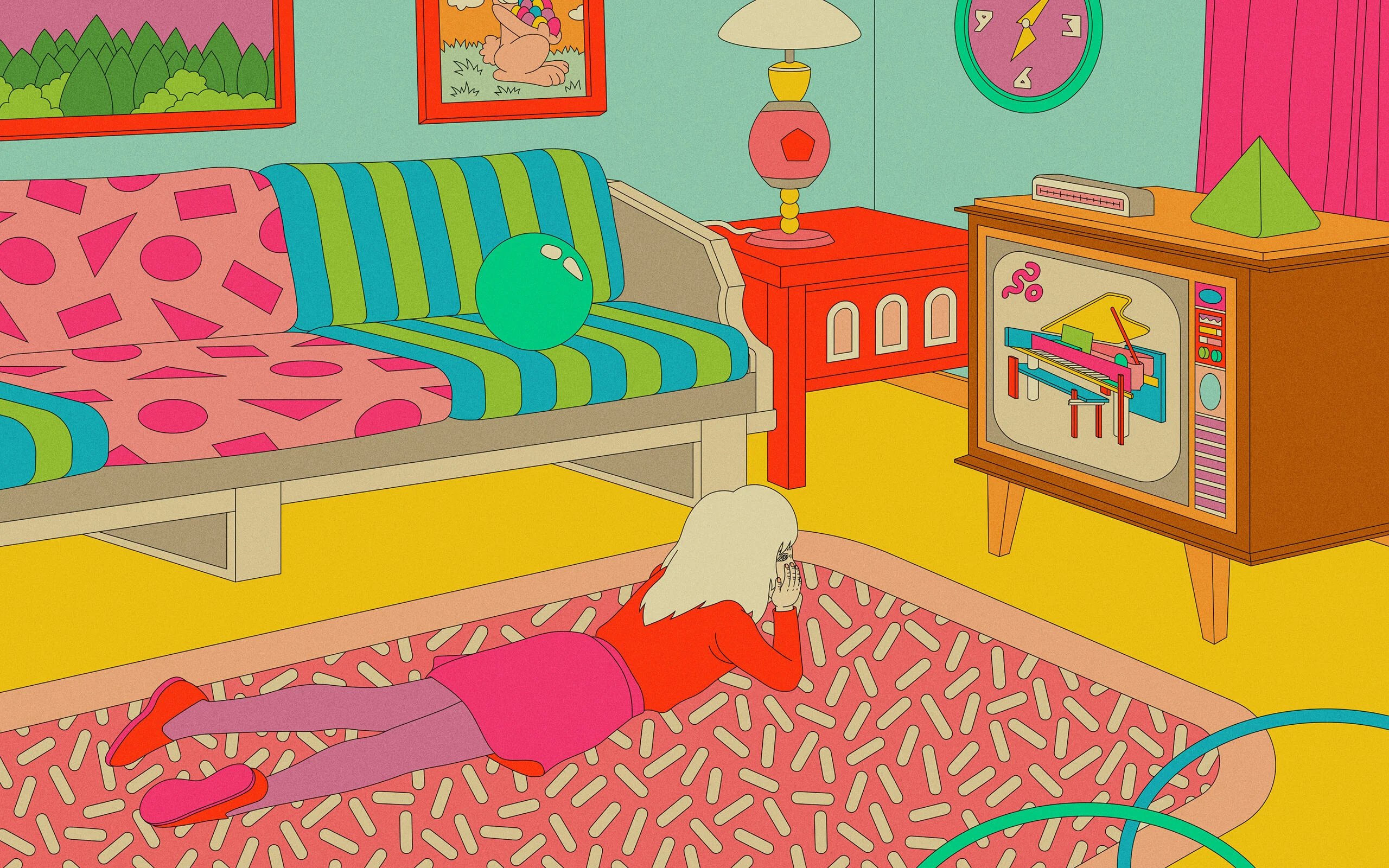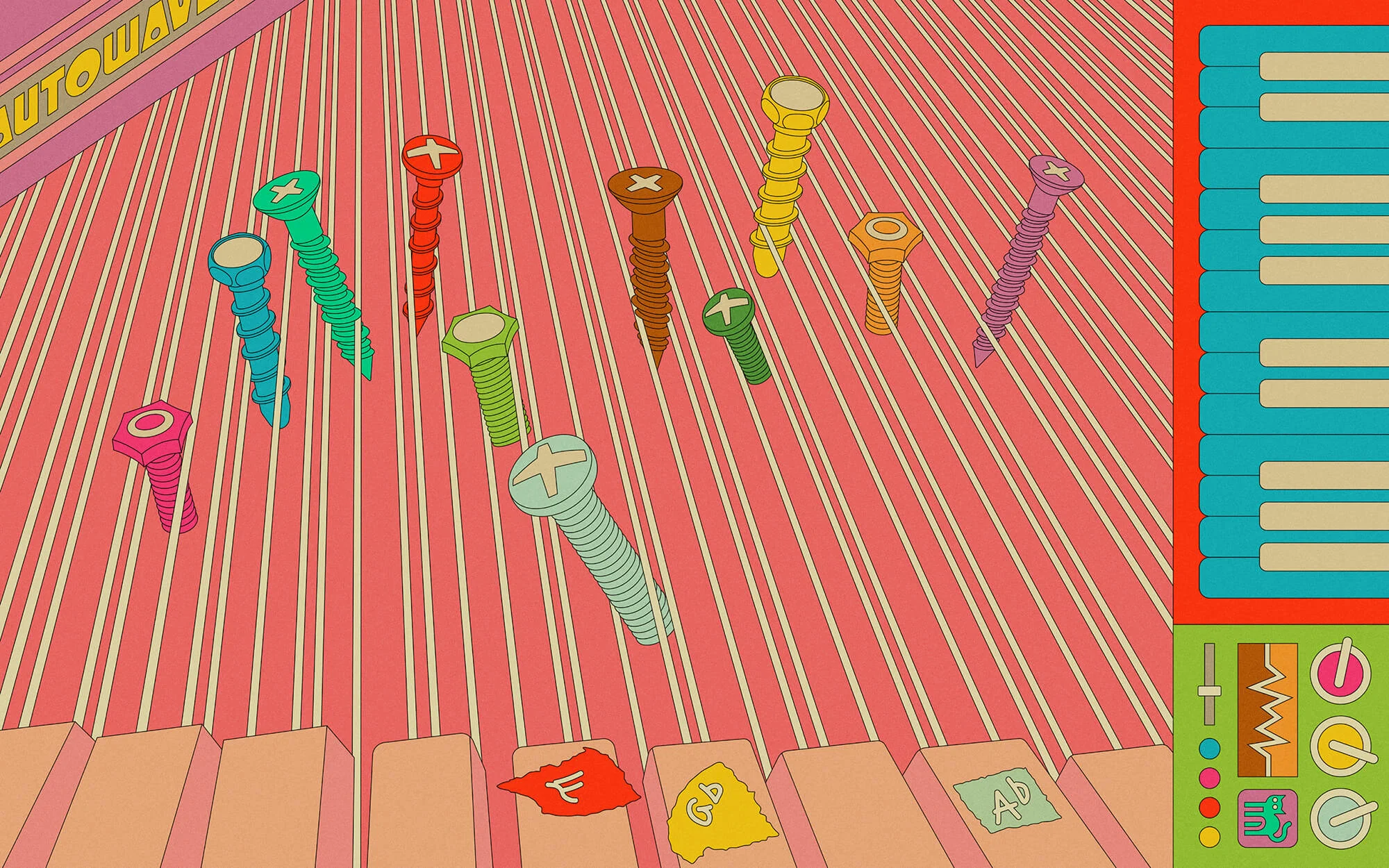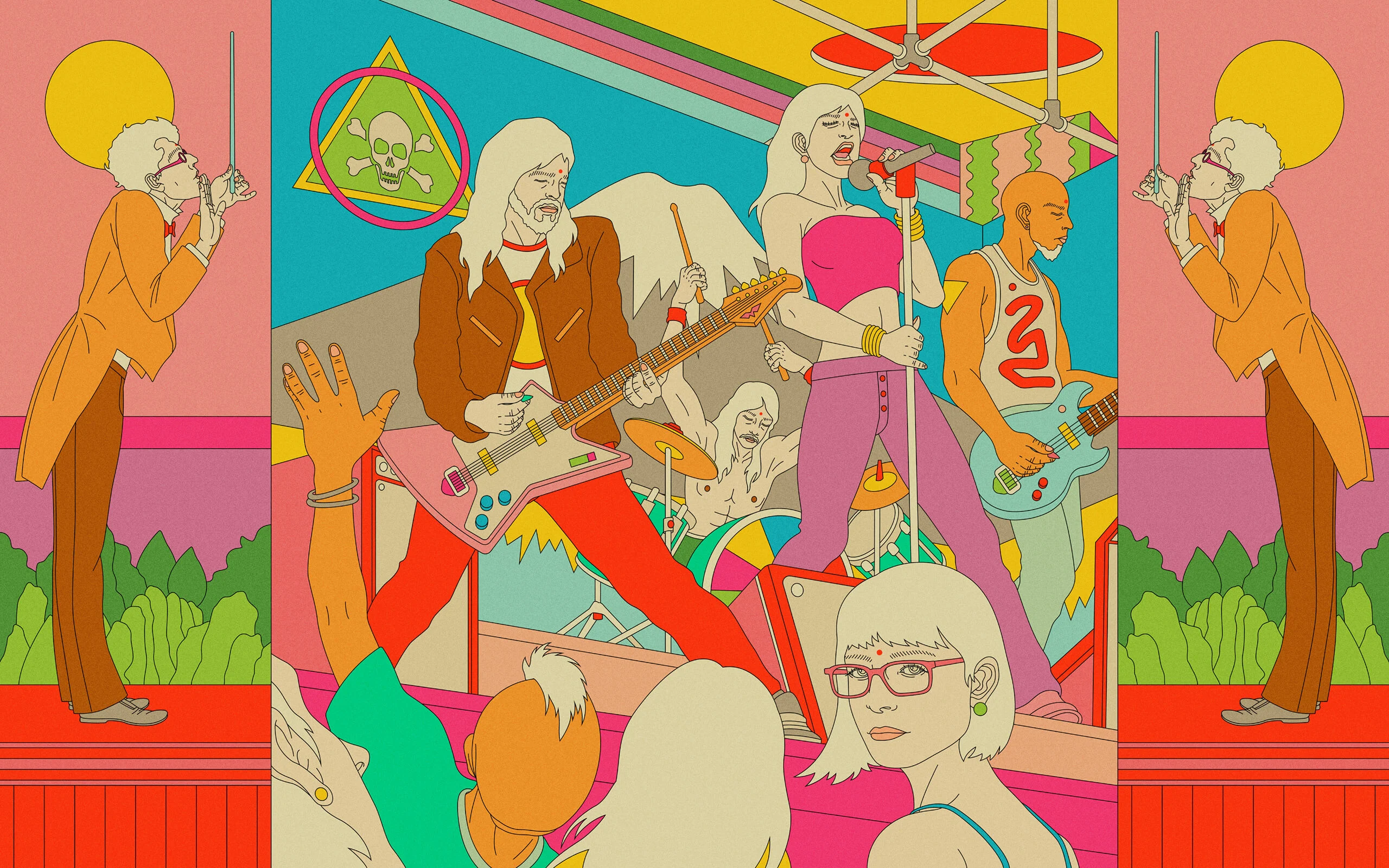

Sometimes it takes getting stuck to refresh your creative process. That’s what happened to Kelly Moran, an experimental pianist signed to Warp Records. Her 2018 album Ultraviolet was born out of a trip into the woods. Paul Wilson found out how a day getting lost in nature changed her whole way of working.
Illustrations by Ardneks Paraiso.
The day Kelly Moran’s creative life changed forever didn’t start out looking special. She wasn’t in a good place, she was tired and her creative energy was gone. The goal that morning was not to end up making something. She just wanted to reset.
“I was composing for a musician who was basically rejecting everything I was sending them,” Kelly says. “It was really difficult because I thought I was doing a good job and it was the first time I had an experience like that. It was really annoying and had been stressing me out for weeks.
“Finally I was like, I have to turn my brain off and stop thinking about the thing that's bothering me. So I took a trip into the woods, went for a swim in the ocean and tried to forget about everything.”
Listening to the sounds of nature, the echoes in the forest, made me realize the work I was doing felt so forced.
It didn’t quite go as planned. Instead of clearing her mind, the time Kelly spent in the Welwyn Preserve, a nature reserve on the north shore of Long Island in New York State, filled her with new ideas.
“Sitting in the woods, I was thinking about how hard I was trying and about the process I was used to. I started to think about shifting how my music felt and how it sounded,” Kelly says.
“And I know it sounds cheesy, but listening to the sounds of nature, the echoes in the forest, made me realize the work I was doing felt so forced. I needed to relax a bit and allow things to come a bit more naturally.”

She went back to her parents’ house, where she was staying, and sat down at the piano with no endgame in mind. “It was the first time in years I’d done that,” she recalls. “Not thinking, is this going to be a record? Just pure expression.
“I definitely achieved a different state of consciousness while I was playing, so focused and so in the music. Everything happening around me was completely irrelevant, completely shut out. Every time I sat down to make a new piece, it felt like I was having a completely new experience of the instrument.”
Ultraviolet, the 2018 album resulting from her trance-like, inspired improvisations, became her most high-profile release. It’s taken her career to the next level.
Kelly can’t remember the TV show she was watching, aged six, when she saw someone playing the piano and asked her parents if she could have one. “They got me a little keyboard to see how much I liked it. I took to it really quickly. My mom was really into antiques at the time and she found me an antique piano. I became obsessed and didn't stop playing.”
More than two decades later, Kelly’s still driven to find new sounds from an instrument that’s been around for more than 300 years. She plays prepared piano, where items are placed between the strings to alter the sounds it can produce.
These items, known as “preparations,” can be anything, but are often small everyday objects. In theory, there are infinite changed sounds a prepared piano can play, but there’s only one way to prepare a piano – extremely carefully.
“First you push the sustain pedal down so the strings are free,” Kelly explains. “Then you take a chopstick and gently move a string out of the way, then you push, say, a screw or a bolt between the strings, then you gently push the string back so you’re not scraping the strings or touching them with the oils of your hands.
“I prepare my piano at home and pianos aren't cheap. I would never want to damage one. I take it very seriously.”

On Ultraviolet, as on her previous albums – four self-released and 2017’s Bloodroot on Telegraph Hard records – she also contributes production and electronics. She has a degree in music composition, production and engineering from the University of Michigan (and for her MFA at the University of Irvine in California, she studied the collaborative process between composers and choreographers).
Kelly’s music has been variously described as avant-garde, minimalist, post-modern and post-post-modern. What’s certain is that her music is beautiful and haunting. She is not the first person to bridge the worlds of classical music and electronica, but her unique sounds make her a stand-out musical creator.
Her musical peers think so too. Dan Lopatin, aka Oneohtrix Point Never, sought out Kelly after discovering her work and asked her to be part of his ensemble for Myriad – the live experience he was building to tour his 2018 album Age Of. At their first meeting, Kelly played him an early version of Ultraviolet.
Dan was impressed by her original sounds and sent it to a couple of record labels. A few emails and one lunch later, and Warp Records – the legendary electronica independent label and home of Aphex Twin, Flying Lotus, Boards of Canada and Autechre – was also the new home of Kelly Moran.
“It was so shocking to me,” she says. “I've faced a lot of rejection as a musician, especially from labels. The main criticism I've had was I didn't fit in, that what I did sounded too different or was too weird, too leftfield. It was so nice to have the people at Warp say, no, we like you because you're so different.
“Most people haven't discovered my music yet. I'm still a new artist. Warp's whole MO is they like to discover someone and nurture them. I lucked out being so unsuccessful for so long that it actually paid off.”
Ultraviolet came out at the end of 2018 to excellent reviews. Kelly also joined Dan/Oneohtrix to play Myriad to international audiences, and will be playing a series of solo shows in Europe in March and April 2019. Live music has always been part of Kelly’s musical make-up; she has been a bassist and keyboardist in experimental bands, and she can often be found in the crowd for shows in New York metal bars.
“I love metal. There's a metal bar in Brooklyn called Saint Vitus which is one of my favorite places to hang out and see shows. A lot of my friends in the music community in New York are experimental and metal musicians, so it's still a pretty big part of my life,” Kelly says.
“There’s definitely a big overlap between classical music fans and metal fans. People who listen to Metallica but appreciate a Mahler symphony. I think it's because there is a similar complexity to the music; there's a heaviness to it.”

Metal is a favorite on Kelly’s running playlists, along with new hip-hop and rap – anything, she says, with a consistent beat. She likes to run every day if she can, for personal and professional reasons. She’s suffered from anxiety since high school, when she started to feel more pressure to perform her music. In college, having tried therapy and medication, she discovered running.
“It gets rid of a lot of my nervous energy,” Kelly says. “I know I can focus much better afterwards. I'm at a point in my career where I definitely overthink a lot of the things I do, especially now I’m on a prestigious label and I have more people who know about me.”
That process worked for this record and the next record is probably going to be completely different.
Open-mindedness is one of the most powerful tools in Kelly’s locker. Ultraviolet only came about because she was willing to do the opposite of what was expected of her – and what she expected of herself – by deliberately clearing her mind.
“It's funny because I go back to that forest and that beach because I live right by there, and I have fond memories. It's even more of a special place for me because it helped me have that experience.
“But I haven't deliberately tried to create those conditions. That process worked for this record and the next record is probably going to be completely different. Now I know that I have this in me, it makes me excited and inspired to do more work in the future.”

